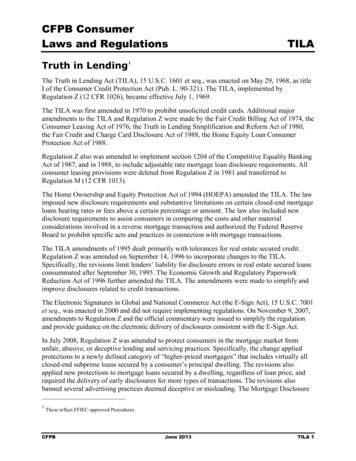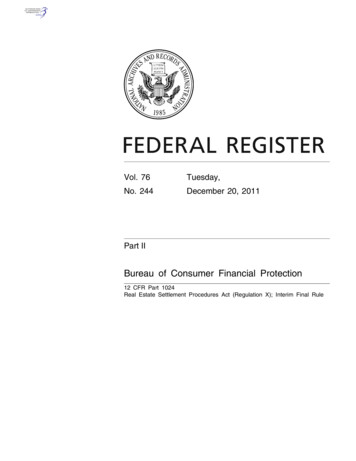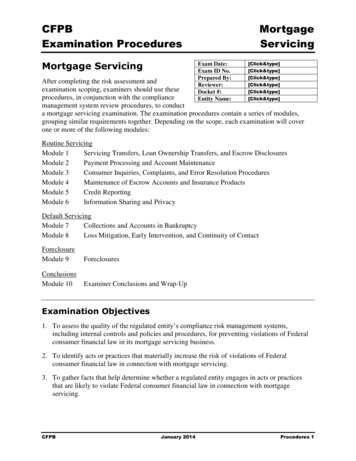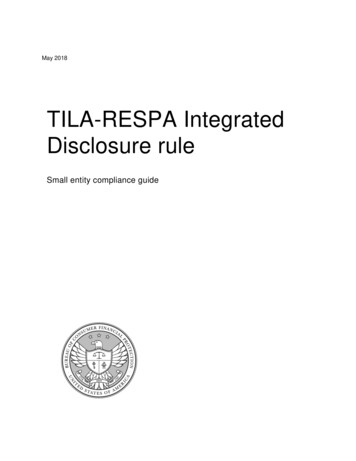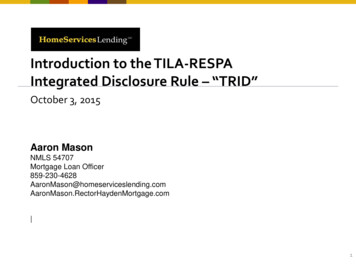
Transcription
Introduction to the TILA-RESPAIntegrated Disclosure Rule – “TRID”October 3, 2015Aaron MasonNMLS 54707Mortgage Loan comAaronMason.RectorHaydenMortgage.com 1
TILA-RESPA Integrated Disclosure Rule (TRID)October 3, 2015represents the start date for anew way mortgage lenders,Realtors , borrowers, and closingagents will be conductingbusiness.2
CFPB and “TRID”The CFPB is introducing: New disclosures New mandatory waiting periods Other important changes to theapplication-to-close processThe CFPB’s goals: Empower customers to make informed decisionsProvide key details about loan terms, estimated costs, and cash needed toclose in a single document Close with confidenceRemove the pressure of signing without understanding3
TRID Rule – What is Changing? DisclosuresLoan Estimate (LE) will replace the GFE and initial TIL Closing Disclosure (CD) will replace the HUD-1 and final TIL Timeline for on-time delivery of both disclosures List of prohibited pre-disclosure Activities Activities that cannot take place before initial disclosures are sent,such as the collection of the fee to order and pay for the appraisal Tolerance levels for changes to disclosed estimate Which settlement charges can change and to what extent4
TRID RuleThe new rules DO NOT apply to:1. Home Equity Lines of Credit (“HELOC”)2. Reverse Mortgage Loans3. Mobile Homes Not Secured to Land4. “All Cash” Transactions5. Seller-Held Mortgage or Contract5
CFPB Mandated ChangesLoan Estimate (LE):This new form replacesboth the GFE and initialTIL and combines theminto ONE document. Effective for all applicationstaken on or after 10.03.2015. Applications taken prior to10.03.2015 would be governedby the old rule anddocuments.6
LE Tolerance Levels that are ChangingZero Tolerance10% ToleranceNo LimitCharges that cannotincrease:Charges that can increaseby 10% above the amountdisclosed in the LE:Charges outside the lender’scontrol that may exceed theamount disclosed on the LE byany amount: Charges paid to lender orits affiliates Charges paid to a thirdparty if lender did notpermit the borrower toshop (ex. appraisal fee) Transfer taxes Recording fees Charges for third-partyservices where: Charges are not being paidto lender or its affiliates Borrower selects thirdparty service provider fromlender’s list of serviceproviders even thoughhe/she are free to shop forhis/her own provider Escrows and prepaids Borrower selects a third-partyservice provider who is not onthe lender’s list and is lenderrequired service(s). Charges paid to third-party orlender affiliates for servicesnot required by the lender.7
Loan Estimate (LE)Certain costs and expenses quoted by the lender may bebinding or subject to variances. For example: Lender origination fees 0% tolerance Charges paid to affiliates, such as a title company.Important to get accurate title fees up front 0% tolerance Charges paid to third party if lender did not permitthe borrower to shop (ex. appraisal fee) up front0% tolerance8
Implications to Prequals and Preapprovals To issue a LE, there are specific pieces of information we need from theborrower. If we don’t have those, we can’t move forward. Prequals: We have no documentation. We can’t ask for it, and wehaven’t received it. Preapproval letters: Borrower voluntarily provided HSL withdocumentation supporting his/her financial status. The borrower is notrequired to provide the documentation. Application: When we receive the following six (6) pieces ofinformation (in writing or verbally), we must provide a LE:1.2.3.4.5.6.Consumer’s NameConsumer’s Monthly IncomeConsumer’s Social Security Number to obtain a credit reportSubject Property AddressAn Estimated Value of PropertyMortgage Loan Amount Requested9
CFPB Mandated ChangesClosing Disclosure (CD):This new form replacesboth the HUD1 and finalTIL and combines theminto ONE document Effective for all applicationstaken on or after 10.03.2015. Applications taken prior to10.03.2015 would be governedby the old rule and documents.10
Closing Disclosure (CD) The lender must ensure that theborrower receives the CD no laterthan three (3) business daysbefore closing. The CD is considered received three (3) business days after it isdelivered, unless given to the borrower in person. Mail Fax Email* Overnight courier If CD is sent electronically from Encompass (“e-disclosure”) theborrower must “accept” it before it counts as “received.”11
Closing Disclosure (CD)12
Change to Closing TimelineHow to handle rushes To prepare and deliver the CD, clear-to-close should beobtained not less than seven (7) business days prior toanticipated close date. Review periods are mandated to allow time frames forloan disclosure, delivery, and borrower understanding. Still manage to date in sales contract. Consummation isthe date the borrower signs for a purchase.13
Closing Process: Settlement Agent / Escrow Agent / Attorney Settlement agent/escrow agent/attorney should submitfinal closing figures ten (10) business days prior toconsummation Including seller figuresIncluding adjustments Changes made or required after issuance of the CD may ormay not require a restart of the three (3) business dayborrower review period.14
Changes Resulting in NEW 3-Day Review PeriodChanges requiring restart of 3-day review period that are loan-relatedsuch as: If Annual Percentage Rate (APR) becomes inaccurate when APRvaries by more than 0.125% Change in interest rateChange in closing attorney feesChange in recording feesOther attorney-driven charges: Documentation prep fees Courier fees Interest per diem charges Any modification or changes to loan fees and/or loan amount Change in loan product Fixed to adjustable Interest only to non interest only If a prepayment penalty is added to loan feature.15
Changes with NO Impact to 3-Day Review PeriodNo three (3) day review period for: Adjustments for issues arising out of walk-throughs, solong as the purchase price is not modified Oil tank/utility adjustments Obligations required of Seller and discussed after deliveryof CD (i.e., liens, unpaid taxes, etc.)16
Closing / Consummation Date Still manage to date in sales contract. Consummation isthe date the borrower signs for a purchase. Exceptions to mandatory 3-day review period are onlypermitted for bona fide financial emergencies.17
Bona Fide Financial Emergency Must be requested and penned by the borrower in writing. Request must detail nature of financial emergency. Financial emergencies are very limited in scope by the newregulation:Property facing imminent foreclosure Not bona fide financial emergencies: moving van is on theway; or sellers/buyers not being available because of travel,vacations, business trips, etc. 18
Customer’s Review The customer has the right,if requested, to review allrevisions made to the CDthe day prior to closing. If not requested, changescan be reviewed at theclosing table.19
Seller’s Closing Disclosure Settlement agent/attorney maintains the responsibility ofdelivering the CD to sellers. Sellers do not sign CD.20
We will be happy toanswer your questions.Thank you for attending!
List of prohibited pre-disclosure Activities Activities that cannot take place before initial disclosures are sent, such as the collection of the fee to order and pay for the appraisal Tolerance levels for changes to disclosed estimate Which settlement charges can change and to what extent TRID Rule -What is Changing? 4


